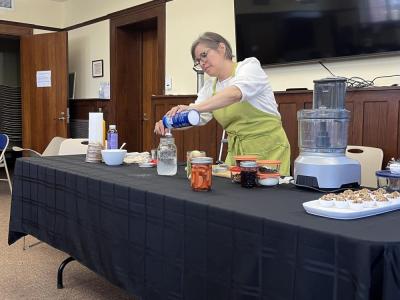Cookbook author encourages healthy habits
MATTAPOISETT— To help maintain her healthy lifestyle, best-selling cookbook author Terry Walters incorporates rotten vegetables into her diet.
According to Walters, fermented foods, like kimchi and miso go through a process of controlled rot that creates nutrient dense food which aids with digestion by supporting “good” bacteria in the gut.
Walters gave a presentation about her latest cookbook “Nourish” which explores plant-based recipes with fermented foods at Mattapoisett Library Free Public Library on Sunday, April 16.
“Nourish” is Walters’s fourth cookbook centered on healthy recipes. Her other titles include “Clean Food: A Seasonal Guide to Eating Close to the Source,” “Clean Food: A Seasonal Guide to Eating Close to the Source : with More Than 200 Recipes for a Healthy and Sustainable You,” and “Eat Clean, Live Well.”
Walters was inspired to pursue a clean lifestyle after her father had a heart attack.
“I learned that I had very high cholesterol and I didn't want to go on drugs at 21,” she said.
Walters encouraged her audience to take a simple approach to adding healthy changes to their eating habits.
Walters said that one of the easiest ways to improve your diet is to shorten the time frame it takes to eat “all the colors of the rainbow.”
One of those colors being green, which Walters argues is the most important color.
“But green bitter is the most important taste, especially for us up here in the Northeast,” she said. “The greens allow us to get that chlorophyll from the sun.”
When listing examples of green superfoods one audience member shouted out “sea vegetables.”
“You would never hear that someplace else,” said Walters with a laugh.
Walters encouraged audience members to try making their own fermented foods to save money while adding nutrient dense foods to their diets.
“You have to take a small mortgage to buy superfoods,” Walters said with a laugh.
However, Walters’s suggestion to her audience did not come without warning.
“If you have too little salt, you'll grow all sorts of funky things that you don't want to eat,” she said.



.jpeg)









